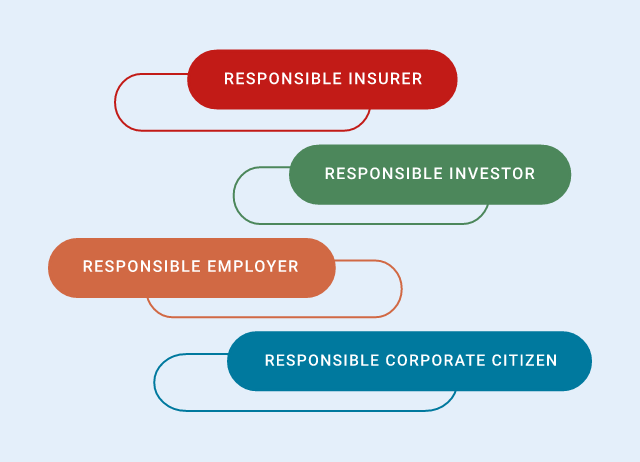Commitments to the environment and climate

We want to support the transition to a more sustainable economy and society and we therefore adopted clear principles to guide our decisions to:
- mitigate global warming and develop climate change adaptation strategies;
- reduce the consumption of natural resources and promote circular economy;
- protect and restore biodiversity, prevent pollution.
We put these principles into practice by monitoring and reducing the impact of the Group's operational activities, and indirect impacts related to our products, services and investments. We also collaborate with governments and associations to promote the development of system solutions.
In particular, we have identified the following areas of intervention, for which we have established specific indicators and targets to be achieved:
- integration of environmental and climate aspects into insurance and investment strategies;
- strengthening public awareness of environmental and climate risks by promoting dialogue between stakeholders;
- reducing environmental impacts generated by the Group's offices, data centers and the staff mobility ;
- demonstrating transparency regarding our policies and reporting on the results achieved.
The Generali Climate Transition Plan, approved by the Board of Directors in November 2025, defines the commitments, levers, resources and governance mechanisms through which Generali supports a just transition towards a net-zero greenhouse gas emissions economy. The plan replaces and enhances previous documentation, like the Technical Note on Climate Change, under the Corporate Sustainability Reporting Directive (CSRD) and European Sustainability Reporting Standards (ESRS) E1 requirements, confirming Generali's commitment to limit global warming to 1.5 °C, in line with the Paris Agreement and climate neutrality by 2050.
In order to manage the risks and opportunities related to climate change and the green transition, we are implementing the following Strategy.
- By 2025 € 8.5 to € 9.5 billion in new green and sustainable investments in addition to those already made by the end of 2020.
- Increase of investments in climate solutions by € 12 billion in the period 2025-2027.
- Exclusion of new listed investments and gradual divestment from from thermal coal companies.
- Exclusion of new non-listed investments in thermal coal infrastructures.
- Phase-out of investments in the coal sector by 2030 for OECD countries and by 2040 for the rest of the world.
- Exclusion of new listed investments and gradual divestment from integrated oil & gas companies identified as transition laggards.
- Exclusion of new non-listed investments in oil & gas infrastructures.
- Exclusion of new investments and progressive divestment from unconventional fossil fuels companies.
- Exclusion of new non-listed investments in unconventional fossil fuels infrastructures.
- By 2025, engagement with 20 carbon-intensive companies in the Group’s investment portfolio.
- Gradual decarbonization of the investment portfolio to reach net-zero emissions by 2050, with intermediate targets related to the reduction of the the carbon intensity of the corporate and real estate portfolios by 60% compared to 2019 and by 2030.
- Development of premiums growth strategy from Climate Insurance Solutions with a CAGR (Compound Annual Growth Rate) of 8-10% over the period 2024-2027.
- Exclusion of new underwriting cover and gradual discontinuation of the existing cover for asset of clients insured for activities strictly related to the thermal coal industry.
- Phase-out of underwriting exposure to the coal sector by 2030 for OECD countries and by 2038 for the rest of the world.
- Forging ahead with the commitment to no longer insure clients operating in upstream oil and gas, both conventional and unconventional.
- Exclusion of new underwriting cover for midstream and downstream asset of integrated oil & gas companies identified as transition laggards.
- Gradual decarbonization of the insurance portfolio to reach net-zero emissions by 2050, with intermediate targets related to the reduction of the carbon intensity of the insurance portfolio related to private-use vehicles by 30% and the Corporate & Commercial portfolio by 40% by 2030 compared to 2021.
- Reduction of greenhouse gas emissions from operational activities related to offices, data centres and mobility compared to the base year 2019 of 35% by the end of 2025, and of 60% by the end of 2030. The scope of these targets include Scope 1, Scope 2 and Scope 3 for operational activities.
- Achievement of net-zero emissions by 2035 through the reduction of 90% of Scope 1 and Scope 2 emissions from operational activities and the compensation with carbon removals of the residual emissions.



